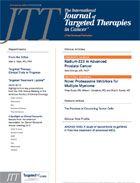Proteins Identified as Potential Biomarkers for Response in KRAS-Mutated NSCLC
A preliminary in vitro study has found markers that may predict response to drugs that target KRAS-mutated non-small cell lung cancer.
Aaron N. Hata, MD, PhD
A preliminary in vitro study has found markers that may predict response to drugs that targetKRAS-mutated non-small cell lung cancer (NSCLC), according to research presented at the AACR 2013 annual meeting. The investigators identified three proteins that may predict response to treatment with a MEK inhibitor plus a PI3 kinase inhibitor—an investigational approach to NSCLC, including some KRAS-mutated cancers.
About 25% of all NSCLCs harbor aKRASmutation, and currently there are no proven targeted therapies for such cases. There are, however, therapies targeted to cancers with activatingEGFRmutations andALKtranslocations.KRAS-mutated NSCLCs represent a heterogeneous group of cancers, and it is possible that the combination of a MEK inhibitor and PI3 kinase inhibitor may be effective for some forms ofKRAS-mutated NSCLC, but not for all patients with this type of cancer, explained lead author Aaron N. Hata, MD, PhD, a clinical fellow at Massachusetts General Hospital in Boston. “We want to be able to identify which patients will respond to this combination therapy and tailor their treatment accordingly.â€
Hata and colleagues studied a variety of NSCLC cell lines with mutatedKRASand evaluated response to MEK and PI3 kinase inhibitors. Some of the cell lines responded to the therapies by undergoing apoptosis, while others did not.
“Our results were not surprising from the standpoint that induction of apoptosis is known to be an important element of response to cancer therapy. What was surprising was the difference in apoptosis among the cell lines,†Hata said. Lack of apoptosis to the combination of MEK and PI3 kinase inhibitors correlated with the decreased expression of procell death mediators and the upregulation of antiapoptotic regulators.
Three specific proteins predicted response: Bim and Puma proteins induced cell death, while Bcl-xl protein inhibited cell death. Prior research has established that manyKRAS-mutant lung cancers also have aP53mutation, and the P53 protein is involved in apoptosis. In this study, TP53 did not predict response to the investigational drug combination, but it did affect how the cells underwent apoptosis.
Hata acknowledged that this was early in vitro work, and that human studies are needed to explore whether the three proteins predict response to MEK and PI3 kinase inhibitors in the clinical setting.
“Ultimately, the goal would be to have the ability to measure the levels of these proteins before a patient is treated. If he or she had favorable levels, then this would predict a likely response; but if the levels are not favorable, that would suggest the need to try a different treatment,†Hata said.
Reference

Survivorship Care Promotes Evidence-Based Approaches for Quality of Life and Beyond
March 21st 2025Frank J. Penedo, PhD, explains the challenges of survivorship care for patients with cancer and how he implements programs to support patients’ emotional, physical, and practical needs.
Read More